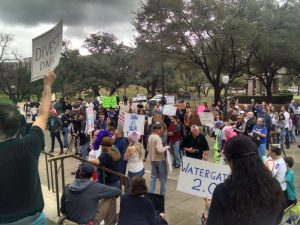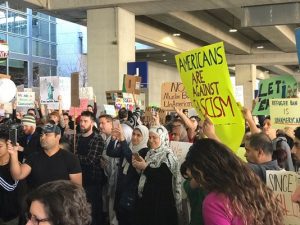by Andrew Krebs
Alternative fact: We’ll be safer if we ban Muslim travelers and deport undocumented immigrants.
Fact: Terrorism and terroristic threats are most likely to come from radical right-wing, white nationalist groups within the United States.

February 20th was “Not My President’s Day” for many people who continue to be dissatisfied with the current administration. Here in Austin, TX, folks gathered for an afternoon rally at the state capitol to lament the otherwise renowned holiday, and similar demonstrations occurred across the U.S. Indeed, over the course of the past month – President Donald Trump’s first in office – oppositional rallies and protests have been a large piece of an even greater resistance movement. For myriad reasons, #manypeoplearesaying they are unhappy with the new administration… from the unqualified Cabinet nominations to feuds with foreign leaders and every little concern about the security of our nation’s intelligence in-between. Perhaps most upsetting are the recent executive orders (EOs) pertaining to travel and immigration.
President Trump’s administration received huge backlash following the EO that was signed on January 27th. This specific EO, titled, “Protecting the Nation From Foreign Terrorist Entry Into the United States”, called for 1) a 90-day temporary bar on all entrance into the US from seven countries (Iran, Iraq, Libya, Somalia, Sudan, Syria and Yemen), 2) a 120-day hold on all refugees seeking asylum in the U.S., and 3) and an indefinite hold on refugees from Syria. While the full text of the EO can be read here, it is important to note that The White House published a misleading version of the EO on its own website. Nonetheless, as the title suggests, President Trump and his aides contend that the travel measures outlined in the EO are necessary to secure public safety. Critics, in response, have challenged that assertion and successfully argued against the EO in federal court. As a result, the U.S. Court of Appeals for the 9th Circuit ruled in favor of the lower court’s temporary restraining order against the Trump Administration, effectively freezing the Department of Homeland Security from enforcing the travel ban. While the technical and legal justification for maintaining the temporary restraining order against the Trump Administration is in line with the “immediate and irreparable harm” caused by the travel ban, there is a separate empirical question pertaining to whether or not travelers coming from these countries actually pose a real threat to public safety. In these terms, the Trump Administration has failed 1) to provide evidence of a terroristic threat from the seven countries named, and 2) to prove that the current refugee vetting process is insufficient.

To protest the EO, I joined a group of several hundred for a rally at the Austin-Bergstrom International Airport on January 29th. There, I heard from other people who were sharing their own frustrations, fears, anger, and resentment towards the Trump Administration. One by one, individuals in the crowd passed around a megaphone and shared why they had come to protest that day. Some folks proudly disclosed that this was their very first protest and that the recent EO had galvanized their political action.
Standing outside of the airport that day, I imagined what it looked like behind the scenes of airport security. Most ominous to me was the fact that some of our nation’s top law enforcement agencies (specifically the Department of Homeland Security, the Transportation Security Administration, and Customs and Border Patrol) proved willing and able to carry out President Trump’s likely unconstitutional agenda, and that this authority went unchecked for a not-inconsequential-period of time before the federal court’s ruling. This made me think generally about power, and specifically about the transfer of authority. It made me think about the excuse of, “I am just following orders”. And it made me think of the classic Milgram Experiment, which tested human obedience to authority. Perhaps I’ve grown cynical in these times, but it was Stanley Milgram (1963: 371) who referenced Nazi Germany as inspiration for his research: “Obedience, as a determinant of behavior, is of particular relevance to our time… Gas chambers were built, death camps were guarded… These inhumane policies may have originated in the mind of a single person, but they could only be carried out on a massive scale if a very large number of persons obeyed orders.” Yes, Donald Trump signed the EO, but he had to rely upon other agencies and officers to enforce it.
As it stands right now (with the original EO blocked by the courts), it seems the Trump Administration has resigned to drafting a new order. In the meantime, Immigration and Customs Enforcement (ICE) officers continue to carry out massive raids in dozens of cities across the nation (including Austin), searching for undocumented immigrants because – you guessed it – President Trump signed an EO on January 25th titled, “Enhancing Public Safety in the Interior of the United States”. This is, of course, despite no real evidence to warrant such action. In fact, the research on crime and immigration in the United States is unequivocal 1, 2, 3, 4, 5: Immigrant populations are less likely to commit crime compared to the native-born population, and areas with high rates of immigration are associated with lower rates of crime. In other words, undocumented immigrants do not pose a specific or immediate threat to public safety or national security. The crime just isn’t there, but the fear of crime and public anxiety towards ‘the other’ is real and has been fostered by a culturally and historically deep sense of racism and xenophobia that has never been or yet to be truly reconciled. Until then, we have to resist the fear and misinformation. As scholars, teachers, and researchers, we are poised to let our work be our resistance.
References
Milgram, Stanley. 1963. “Behavioral Study of Obedience.” Journal of Abnormal and Social Psychology, 67(4); 371-378.
Andrew Krebs is a 4th year doctoral student in the Department of Sociology. His research examines peer influence in crime, and the particular benefits of mental health peer support in the community re-entry process. You can follow him on Twitter at @A4Andrew.


